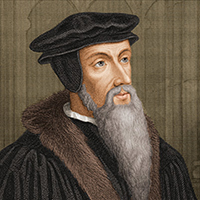 John Calvin: “The True Knowledge of God Comes Through His Word”
John Calvin: “The True Knowledge of God Comes Through His Word”
Therefore, though the brightness which is presented to every eye, both in the heavens and on the earth, leaves the ingratitude of man without excuse — since God, in order to bring the whole human race under the same condemnation, holds forth to all without exception a mirror of his Deity in his works — another and better help must be given to guide us properly to God as a Creator. Not in vain, therefore, has he added the light of his Word in order that he might make himself known unto salvation, and bestowed the privilege on those whom he was pleased to bring into nearer and more familiar relation to himself.
For, seeing how the minds of men were carried to and fro and found no certain resting-place, he chose the Jews for a peculiar people, and then hedged them in that they might not, like others, go astray. And not in vain does he by the same means retain us in his knowledge, since but for this, even those who in comparison seem to stand strong, would quickly fall away.
For as the aged (or those whose sight is defective), when any book however fair is set before them, though they perceive that there is something written are scarcely able to make out two consecutive words, but when aided by glasses, begin to read distinctly, so Scripture, gathering together the impressions of Deity — which till then lay confused in our minds — dissipates the darkness, and shows us the true God clearly. God therefore bestows a gift of singular value when, for the instruction of the Church, he employs not dumb teachers merely, but opens his own sacred mouth; when he not only proclaims that some God must be worshipped, but at the same time declares that He is the God to whom worship is due; when he not only teaches his elect to have respect to God, but manifests himself as the God to whom this respect should be paid.
For if we reflect how prone the human mind is to lapse into forgetfulness of God, how readily inclined to every kind of error, how bent every now and then on devising new and fictitious religions, it will be easy to understand how necessary it was to make such a depository of doctrine as would secure it from either perishing by the neglect, vanishing away amid the errors, or being corrupted by the presumptuous audacity of men.
It being thus manifest that God, foreseeing the inefficiency of his image imprinted on the fair form of the universe, has given the assistance of his Word to all whom he has ever been pleased to instruct effectually, we too must pursue this straight path, if we aspire in earnest to a genuine contemplation of God. We must go, I say, to the Word, where the character of God, drawn from his works, is described accurately and to the life; these works being estimated, not by our depraved Judgment, but by the standard of eternal truth.
If, as I lately said, we turn aside from it, how great so ever the speed with which we move, we shall never reach the goal, because we are off the course. We should consider that the brightness of the Divine countenance, which even an apostle declares to be inaccessible (I Timothy 6:16), a is a kind of labyrinth, to us inextricable, if the Word do not serve us as a thread to guide our path; and that it is better to limp in the way, than run with the greatest swiftness out of it. Hence the Psalmist, after repeatedly declaring (Psalm 93:1; 96:10; 97:1; 99:1) that superstition should be banished from the world in order that pure religion may flourish, introduces God as reigning: meaning by that term not the power which he possesses and which he exerts in the government of universal nature, but the doctrine by which he maintains his due supremacy: because error never can be eradicated from the heart of man until the true knowledge of God has been implanted in it.
~ From The Institutes of Christian Religion


